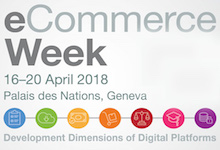Public private dialogue to drive e-commerce
18 Apr 2018 11:30h - 13:00h
Event report
[Read more session reports from the UNCTAD E-Commerce Week 2018]
This session addressed the importance of public-private dialogue for e-commerce developments, focusing on lessons learnt, restraints and limitations, and the way forward. Introducing the session, moderator Mr Saifullah Khan (S.U. Khan Associates, Corporate and Legal Consultants), underscored that e-commerce is here to stay, providing risks and opportunities for businesses, consumers, societies, and governments: ‘No one can escape from the discussion’, making public-private dialogue essential.
Mr Syed Tauqir Shah (Ambassador, Permanent Mission of Pakistan to the World Trade Organization (WTO)) explained that e-commerce provides huge opportunities, but without the right ecosystem, skills, policies, and regulatory framework, e-commerce can be a Trojan horse for developing countries. Therefore, it is important for negotiators at the WTO from all countries to positively engage and to put development at the centre of e-commerce discussions, because ‘if you’re not at the table, you end up on the menu.’ Due to the multistakeholder nature of e-commerce, there is a need for a genuine, engaged, public-private partnership dialogue that includes the voice of consumers and civil society, as well as businesses.
Mr Nicholas C. Niggli (Director General, Economic Development, Research & Innovation at the Republic and State of Geneva) noted the significant growth of e-commerce, even in places with poor connectivity, logistics, and payment systems, and pointed at the enormous potential when technology improves to eliminate current obstacles to e-commerce. Reminding participants of the four billion people who are not yet connected to the Internet, he raised the question of how to avoid a digital divide, not only across, but also within countries, and how to promote small and medium enterprises (SMEs) to ‘get into this game’, avoiding the domination of a few giant players in the digital economy. He added that it is important for governments to embrace the values of responsibility, humanity, and humility, to ensure that no one is left behind, and that through multistakeholder engagement, Geneva is ready to tackle this challenge.
Ms Roxana Radu (Internet Governance Associate at DiploFoundation and Programme Manager at the Geneva Internet Platform) focused on the critical importance of knowledge and trust to be able to drive e-commerce. Knowledge is not only needed in the form of individual e-commerce skills, but also to promote an understanding of e-commerce among decision makers who are negotiating the principles of the digital economy for the next generations. DiploFoundation is assisting this process by monitoring developments in e-commerce and digital commerce via the GIP Digital Watch Observatory and through comprehensive capacity building programmes, including a course on digital commerce. Trust is needed to be able to move to more inclusive solutions, which can only be created with unbiased and complete information, generated by dialogue and the involvement of the private sector and civil society. Promoting trust in the Internet and in e-commerce also requires a commitment to balanced and neutral education, which needs funding and financial commitments.
Mr Boris Kim (Chairman of the Board, QIWI Group and Executive Director, FinTech Association) noted that customer experience is the key driver of e-commerce: Tools are not successful because they are fancy, but because they are convenient. E-commerce flourishes when there is an understanding of consumer behaviour. For fintech companies, public-private dialogue is a must-have, especially considering the strict regulation of the financial sector in most countries. Experiments can only be successfully tested with the engagement of the public sector. Kim also highlighted some of the developments in emerging technology which are likely to play a large role in fintech, including blockchain, open banking, artificial intelligence, and big data.
Mr Nasser Saleh (CEO and Founder, MadfooatCom) shared his experience of working with the Central Bank of Jordan to improve credibility and trust for his e-payment platform. This collaboration enabled the growth of e-payments in Jordan through various channels, enabling businesses to work more efficiently online. While public-private partnerships could constrain companies in innovation, considering the many regulations and details that are part of such partnerships, they also provide credibility, reliability, and trust, and for Saleh, ‘public-private partnership is a must, not an option anymore.’
Ms Maria Ptashkina (Bridges Graduate Fellow, International Centre for Trade and Sustainable Development) explained that while regulation should be driving e-commerce, it is often lagging behind. Trade-facilitation agreements and a growing number of regional trade agreements have started to make explicit references to e-commerce, and the scope of these provisions is increasing (some agreements now include provisions on consumer protection, net neutrality, access to the Internet, etc.). The private sector can help the public sector in better understanding the advantages and constraints that businesses face in cross-border e-commerce.
The next round of interventions focused on the digital divide. Tauqir Shah mentioned that this divide is not only about ‘hard’ infrastructure, but also about ‘soft’ laws. He provided examples of how Pakistan is tackling the digital divide, which requires the right policy framework and multistakeholder engagement. Niggli emphasised the importance of ensuring that ‘the tide is lifting all boats’ but noted that inequalities are still growing in many places. He agreed on the need for multistakeholder engagement and stressed the importance of trust, as e-commerce can only flourish if cybersecurity is addressed. In this context, he noted the Digital Geneva Talks and the recently established Tech Accord. Radu underscored the necessity of having digital content available in different scripts and languages, and Kim and Saleh explained how their companies have worked to address the digital divide. Ptashkina remarked that to address the digital divide, it is necessary to consider the spill overs of digital trade and adopt a holistic approach to policy-making. Shah concluded the discussion by explaining that ‘the future is digital’, and we need to ensure that it is inclusive and common, rather than fragmented and divided.
By Barbara Rosen Jacobson
Related topics
Related event

